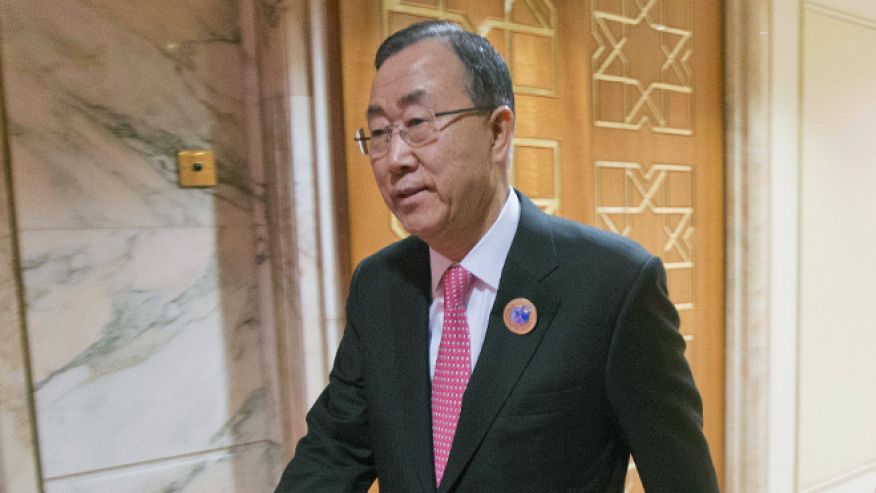
FILE: Jan. 15, 2014: United Nations Secretary General Ban Ki-moon at Bayan Palace in Kuwait City, Kuwait.REUTERS
U.N. Secretary-General Ban Ki-moon has withdrawn his invitation for Iran to participate in Syria peace talks, a spokesman said, after the invite spurred objections from the United States and the Syrian opposition.
The secretary-general's original invitation threatened to unravel the carefully planned meetings later this week in Switzerland, first in Montreux and then in Geneva. Though it was Secretary of State John Kerry who earlier this month floated the possibility of Iranian involvement -- with conditions -- Ban Ki-moon went a step further. To the dismay of the Obama administration, he invited Iran without first demanding that it publicly accept the premise that its ally Bashar Assad must leave power.
But as a Syrian opposition coalition threatened to boycott the talks, Iran refused to accept preconditions. A spokesman for Ban Ki-moon said the U.N. chief was "deeply disappointed" by Iran's statements.
"He continues to urge Iran to join the global consensus behind the Geneva Communiqué," spokesman Martin Nesirky said, referring to an earlier agreement. "Given that it has chosen to remain outside that basic understanding, he has decided that the one-day Montreux gathering will proceed without Iran's participation."
Iran, at that point, already said it would not participate if it had to accept the precondition. In the wake of the U.N. announcement, the Syrian opposition coalition reportedly confirmed it would participate.
For the time being, the secretary-general's decision to back off his invitation helps preserve the peace talks and eases tensions between his office and the State Department, which had urged him to rescind the invite.
"We are hopeful that, in the wake of today's announcement, all parties can now return to focus on the task at hand, which is bringing an end to the suffering of the Syrian people and beginning a process toward a long overdue political transition," State Department spokeswoman Jen Psaki said.
The peace talks are intended to bring together for the first time representatives of Assad's government and members of the Western-backed opposition that is trying to overthrow him.
Diplomats and political leaders acknowledge that a quick end is unlikely for a conflict that has killed more than 130,000 people and touched off the worst humanitarian crisis in decades. The battle lines have been largely frozen since early 2013, and the Syrian National Coalition has little sway or respect within Syria's rebellion.
But the U.N.-hosted peace talks in Geneva and Montreux this week had raised hopes of at least getting the two sides to talk -- expectations that were called into question on Monday.
Ban said he had initially issued the invitation to Iran after "speaking at length in recent days" with Iranian Foreign Minister Javid Zarif, who had "pledged that Iran would play a positive and constructive role in Montreux."
In the Syrian capital of Damascus, Assad held a meeting with the official delegation that will head to the talks, telling them to "prevent any foreign intervention no matter what it is," state TV said. The officials were quoted as saying that they were directed to "start a political dialogue as a first step toward an internal Syrian dialogue inside Syria."
The report said the nine-member delegation will be headed by Foreign Minister Walid al-Moallem, with Assad adviser Buthaina Shaaban and Information Minister Omran al-Zoubi as deputy heads. Other officials would include Deputy Foreign Minister Faysal Mikdad, Syria's ambassador to the U.N. Bashar Jaafari and head of the media office at the presidential palace Luna Chibil.
The aim of the conference, dubbed Geneva 2, is to agree on a roadmap for Syria based on one adopted by the U.S., Russia and other major powers in June 2012. That plan includes the creation of a transitional government of national unity, with full executive powers, and eventual elections.
Iran is Assad's strongest regional ally, offering billions of dollars in credit since the crisis began in March 2011. The United States, Saudi Arabia and several countries in the Persian Gulf suspect Tehran is also shipping him weapons.
The Associated Press contributed to this report.
©2014 FOX News Network, LLC. All rights reserved.
http://www.foxnews.com/politics/2014/01/20/un-chief-withdraw-iran/